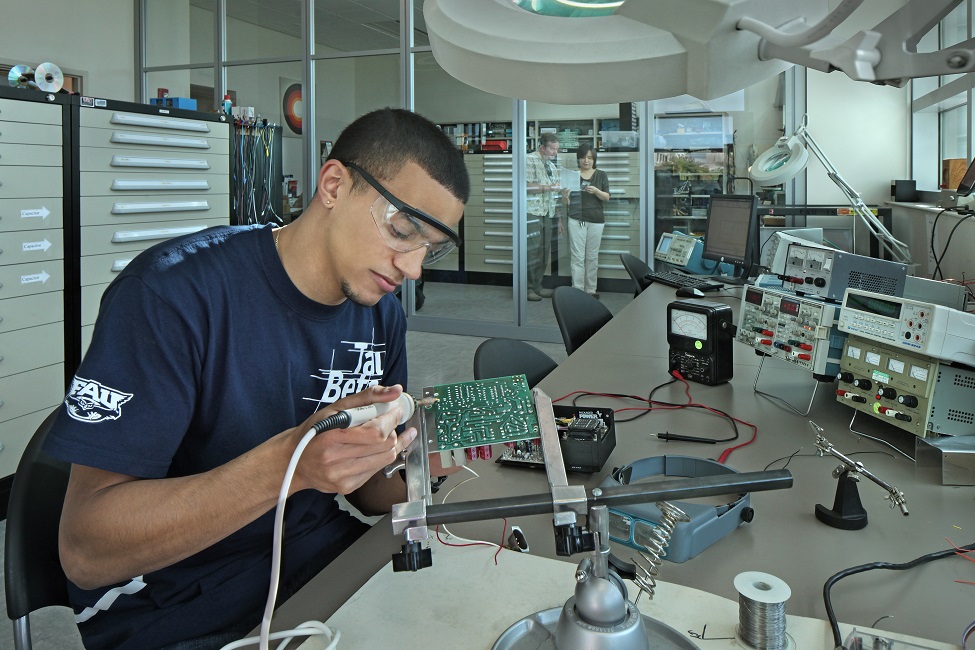U.S. Department of Education Awards FAU $4.4 Million Grant
This Hispanic Serving Institution project (Title III) will increase underrepresented Hispanics in computer-related careers, and facilitate successful post-degree employment or graduate school enrollment.

Hispanics as well as low-income workers are underrepresented in the bachelor’s degree level computer-related workforce and are among the most underrepresented groups in these career fields.
Economic indicators show that the fields of computer science, computer engineering and electrical engineering provide great potential career pathways with large numbers of available jobs in Florida — particularly South Florida. Hispanics make up 29 and 22 percent of the working age population (over 16) in Broward and Palm Beach counties respectively, and these numbers continue to increase. Despite their growing numbers, Hispanics as well as low-income workers are underrepresented in the bachelor’s degree level computer-related workforce and are among the most underrepresented groups in these career fields.
To address the projected gap between computer science, computer engineering and electrical engineering occupations and workers with enough skills to fill these positions in South Florida, Florida Atlantic University has received a $4.4 million grant from the U.S. Department of Education to increase the number of degrees awarded to Hispanic and low-income students in these fields, and to facilitate the rate of successful student post-degree computer science, computer engineering and electrical engineering /STEM (science, technology, engineering, and mathematics) employment or graduate school enrollment.
This funded Hispanic Serving Institution project (Title III) helps eligible institutes of higher education to become self-sufficient and expand their capacity to serve low-income students by providing funds to improve and strengthen the academic quality and institutional management. It is a collaboration between FAU’s College of Engineering and Computer Science, FAU’s College of Education, Broward College (BC), and Palm Beach State College (PBSC).
The project also adapts a well-developed articulation model from the Computer Accelerated Pipeline to Unlock Regional Excellence (CAPTURE) program supported by the Florida Board of Governor’s initiative three years ago in collaboration with PBSC and BC to increase computer science and computer engineering enrollment of high quality students who transferred to FAU from PBSC or BC.
“Hispanic students enrolling at FAU, Broward College and Palm Beach State College are often first generation college students who encounter significant barriers associated with progressing through a complex, multi-tiered system,” said Ali Zilouchian, Ph.D., project director and principal investigator, and a professor and associate dean for academic affairs in FAU’s College of Engineering and Computer Science. “These students also encounter academic challenges that impact their success in computer science, computer engineering and electrical engineering gateway courses. This new collaboration will help us to have a significant impact on the educational success of Hispanic students, which will ultimately enable them to have successful careers in these fields.”
Zilouchian, along with Nancy Romance, Ph.D., co-principal investigator and a professor of teaching and learning in FAU’s College of Education, will work with the FAU Department of Computer and Electrical Engineering and Computer Science’s chair and faculty, and collaborators from PBSC and BC to implement curricular analysis and refinement of five key gateway courses (algebra, calculus, Introduction to Programming in C, Foundations of Computer Science, and Introduction to Logic Design), whose high failure rates serve as barriers to students remaining in the computer science, computer engineering, and electrical engineering programs. They will work toward a careful, iterative course revision process to increase the student success rate for this key group of courses. The program also will provide student academic support consisting of specific, mentor-led peer learning teams as well as motivational support consisting of an ongoing computer learning community.
Only 12 percent of Hispanic students graduating from high school score at or above the proficient level in mathematics, and score 25 percent at or above the proficient level in reading. The National Assessment of Educational Progress reports similar trends for other underrepresented groups (Black and low-income students) for whom 17 percent score at or above the proficient level in reading and 7 percent in mathematics. Poor preparation and proficiency in mathematics continue to be identified by almost every governmental agency report as a key barrier to success in and completion of any STEM degree.
“This exceptional program developed at Florida Atlantic University, in collaboration with our partners, is designed to expand representation of Hispanics in the STEM workforce, and will provide them with a wide range of employment opportunities in a variety of settings including general business, industry, health care, science, education and energy,” said Daniel C. Flynn, Ph.D., vice president for research at FAU.
FAU’s College of Engineering and Computer Science offers a flexible schedule of courses delivered through a variety of formats such as e-learning, distance learning, daily-recorded live lectures, downloadable video streaming, podcasts as well as interactive video courses broadcast to remote locations and featuring two-way audio and video. The college offers a number of sophisticated technological resources to support students enrolled in the computer science programs including 450 workstations, virtual desktops, 19 teaching and research laboratories, five instructional laboratories in computer science, and four laboratories dedicated to support computer programming. The college also is expanding its cloud technology to support network virtualization for in-class and online instruction.-FAU-
Tags: research | engineering | education | students | technology